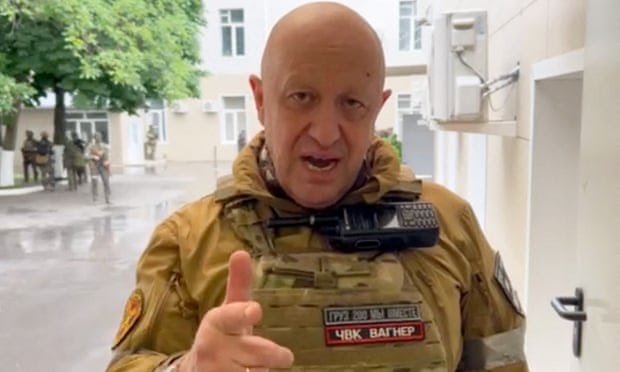
The Kremlin has said the Wagner group head, Yevgeny Prigozhin, met Vladimir Putin on 29 June, five days after his mercenary fighters marched towards Moscow in an aborted rebellion.
The Russian president’s spokesperson, Dmitry Peskov, told reporters that Putin invited 35 senior Wagner commanders including Prigozhin to the Kremlin, adding that the meeting lasted three hours.
The Kremlin’s statements reveal Prigozhin has travelled to Russia at least once since the deal brokered by the Belarusian president, Alexander Lukashenko, under which the warlord abandoned his military march on Moscow in exchange for safe passage to exile in Belarus.
According to Peskov, Prigozhin assured Putin during the meeting that his Wagner troops were loyal to the country and the Russian president.
“The commanders outlined their version of what happened [on 24 June]. They emphasised that they are staunch supporters of the head of state … and also said that they were ready to continue to fight for their homeland,” Peskov said.
Peskov did not comment on Prigozhin’s whereabouts, which remain unclear. Last week, Lukashenko said Prigozhin was in St Petersburg despite Peskov stressing that the deal under which Prigozhin relocated to Belarus “remained relevant”.
Prigozhin’s meeting in the Kremlin suggests he still enjoys some leverage in Russia and is probably seen as a valuable asset, despite having brought the country to the brink of civil war last month.
Moscow’s apparent lenience towards Prigozhin, only weeks after he attempted to march on Moscow with his mercenaries, stands in stark contrast to how the Putin regime usually treats dissent.
While Putin has ordered all Wagner soldiers to sign a contract with the regular army or leave for Belarus, thousands of armed Wagner members are still based in eastern Ukraine.
At the same time, the Kremlin has embarked on a fierce media campaign to discredit Prigozhin, who continues to enjoy some popularity in Russia, according to recent opinion polls.
On Sunday, Vladimir Soloviev, a prominent state TV host, launched a tirade against Prigozhin’s business empire, telling Russian viewers that the mercenary head was a “businessman with a criminal past”.
“He is not the Robin Hood he tried to portray himself as … many of his projects were murky and not always within the law,” Soloviev said during his show aired on the Rossiya-1 channel.
Last week, state media showed clips of a police raid on Prigozhin’s opulent private estate in St Petersburg, footage that was clearly aimed at discrediting his reputation as a critic of the corruption within the Russian elite and military.
The Kremlin has also blocked several media platforms belonging to Prigozhin and has gained control over Wagner warlord’s notorious troll farms.
At the same time, Russian authorities appear to be treading more carefully with issues related to Prigozhin’s business assets overseas. Despite the turmoil at home, Wagner group’s deployments and its extensive network of businesses across Africa are yet to be hit by the fallout from the failed rebellion.
The contradiction in the Kremlin’s relationship with Prigozhin suggests Putin continues to grapple with how best to handle the warlord’s corporate and military legacy, which has deep ties to the Russian government.
With the help of the Kremlin, Prigozhin has built one of the world’s most shadowy and complex corporate structures and his catering companies rely heavily on state contracts.
Meanwhile, Russia’s defence ministry released a video showing Russia’s top general, Valery Gerasimov, ordering subordinates to target Ukrainian missile sites, his first public appearance since Prigozhin’s failed mutiny.
Rumours have been swirling among Russian military bloggers that the Kremlin has sidelined Gerasimov, a veteran Russian commander whose resignation was one of Prigozhin’s core demands during his rebellion.
But judging by footage released on Monday as well as a separate video last week, Putin has kept his two most influential military men, the defence minister, Sergei Shoigu, and Gerasimov, in their positions.
